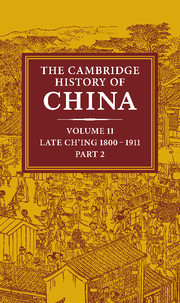Book contents
- Frontmatter
- 1 Economic trends in the late Ch'ing empire, 1870–1911
- 2 Late Ch'ing foreign relations, 1866–1905
- 3 Changing Chinese views of Western relations, 1840–95
- 4 The military challenge: the north-west and the coast
- 5 Intellectual change and the reform movement, 1890–8
- 6 Japan and the chinese revolution of 1911
- 7 Political and institutional reform 1901–11
- 8 Government, merchants and industry to 1911
- 9 The republican revolutionary movement
- 10 Currents of social change
- Bibliographical essays
- Bibliography
- Index
- Map 1. Ch’ing empire – physical features
- References
2 - Late Ch'ing foreign relations, 1866–1905
Published online by Cambridge University Press: 28 March 2008
- Frontmatter
- 1 Economic trends in the late Ch'ing empire, 1870–1911
- 2 Late Ch'ing foreign relations, 1866–1905
- 3 Changing Chinese views of Western relations, 1840–95
- 4 The military challenge: the north-west and the coast
- 5 Intellectual change and the reform movement, 1890–8
- 6 Japan and the chinese revolution of 1911
- 7 Political and institutional reform 1901–11
- 8 Government, merchants and industry to 1911
- 9 The republican revolutionary movement
- 10 Currents of social change
- Bibliographical essays
- Bibliography
- Index
- Map 1. Ch’ing empire – physical features
- References
Summary
THE CHANGING CONTEXT
A new era dawned in Chinese foreign relations after 1861. Western belligerence had given way to moderation, and Chinese resistance to accommodation. Defeat in the two wars and the Anglo-French occupation of Peking climaxed by the burning of the Summer Palace in 1860 had shocked the more pragmatic Ch'ing officials into a realization that a new international situation had set in and that the contemporary Westerners were basically different from the barbarians who had disturbed China in earlier times. There was a growing feeling that ‘the West wind is blowing East’, and that it could not be stopped. It was therefore imperative that China accept this reality, however unpleasant. The more progressive scholars and statesmen resolved to honour China's treaty obligations, to modernize her diplomatic practice, to create Western-style industry and enterprises, and to employ foreigners to help manage the new situation. As a result, a proto-foreign office was established in 1861, a text on international law was translated in 1864, an imperial audience was granted to foreign diplomats without the kotow in 1873, and diplomatic missions were established abroad after 1876. By 1880 China had taken her place in the family of nations and learned to struggle for survival in a world of social Darwinism just like any other state. In form, the Confucian universal empire (t'ien-hsia) had been metamorphosed into a nation-state (kuo-chia), but in spirit the old Middle Kingdom world view still lingered. Torn between tradition and modernity, China went to war to defend Vietnam and Korea in the 1880s and 1890s, partly to fulfil her tributary obligations and partly to exert her suzerainty in the manner of Western colonial powers. When the wars were lost, the tribute system was shattered in theory as well as in practice, marking the total disintegration of the imperial tradition of foreign intercourse.
Keywords
- Type
- Chapter
- Information
- The Cambridge History of China , pp. 70 - 141Publisher: Cambridge University PressPrint publication year: 1980
References
- 6
- Cited by



